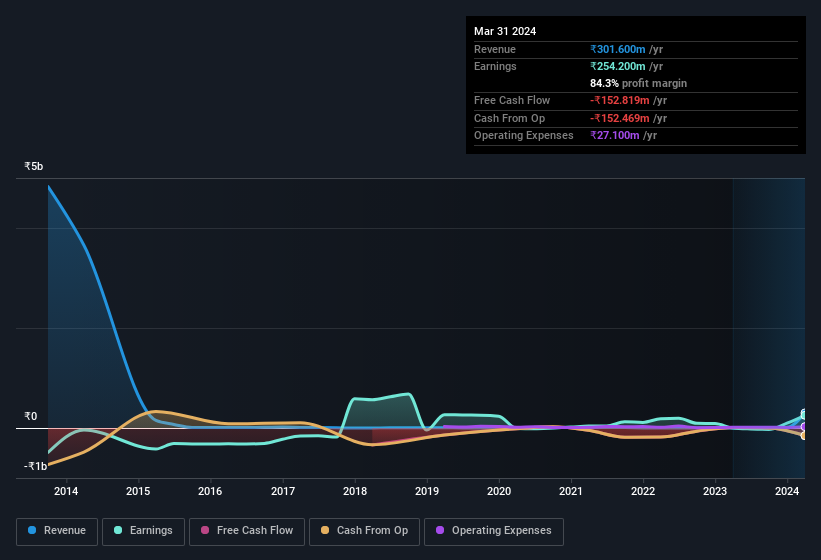Hindustan Motors' (NSE:HINDMOTORS) Solid Earnings May Rest On Weak Foundations

Hindustan Motors Limited's (NSE:HINDMOTORS ) stock didn't jump after it announced some healthy earnings. We did some digging and believe investors may be worried about some underlying factors in the report.
View our latest analysis for Hindustan Motors

A Closer Look At Hindustan Motors' Earnings
One key financial ratio used to measure how well a company converts its profit to free cash flow (FCF) is the accrual ratio. To get the accrual ratio we first subtract FCF from profit for a period, and then divide that number by the average operating assets for the period. You could think of the accrual ratio from cashflow as the 'non-FCF profit ratio'.
As a result, a negative accrual ratio is a positive for the company, and a positive accrual ratio is a negative. That is not intended to imply we should worry about a positive accrual ratio, but it's worth noting where the accrual ratio is rather high. That's because some academic studies have suggested that high accruals ratios tend to lead to lower profit or less profit growth.
Hindustan Motors has an accrual ratio of 4.22 for the year to March 2024. Statistically speaking, that's a real negative for future earnings. To wit, the company did not generate one whit of free cashflow in that time. Over the last year it actually had negative free cash flow of ₹153m, in contrast to the aforementioned profit of ₹254.2m. It's worth noting that Hindustan Motors generated positive FCF of ₹12m a year ago, so at least they've done it in the past.
Note: we always recommend investors check balance sheet strength. Click here to be taken to our balance sheet analysis of Hindustan Motors.
Our Take On Hindustan Motors' Profit Performance
As we have made quite clear, we're a bit worried that Hindustan Motors didn't back up the last year's profit with free cashflow. For this reason, we think that Hindustan Motors' statutory profits may be a bad guide to its underlying earnings power, and might give investors an overly positive impression of the company. But the good news is that its EPS growth over the last three years has been very impressive. Of course, we've only just scratched the surface when it comes to analysing its earnings; one could also consider margins, forecast growth, and return on investment, among other factors. In light of this, if you'd like to do more analysis on the company, it's vital to be informed of the risks involved. For example, we've found that Hindustan Motors has 5 warning signs (3 make us uncomfortable!) that deserve your attention before going any further with your analysis.
Today we've zoomed in on a single data point to better understand the nature of Hindustan Motors' profit. But there are plenty of other ways to inform your opinion of a company. Some people consider a high return on equity to be a good sign of a quality business. So you may wish to see this free collection of companies boasting high return on equity, or this list of stocks with high insider ownership.
Valuation is complex, but we're here to simplify it.
Discover if Hindustan Motors might be undervalued or overvalued with our detailed analysis, featuring fair value estimates, potential risks, dividends, insider trades, and its financial condition.
Access Free AnalysisHave feedback on this article? Concerned about the content? Get in touch with us directly. Alternatively, email editorial-team (at) simplywallst.com.
This article by Simply Wall St is general in nature. We provide commentary based on historical data and analyst forecasts only using an unbiased methodology and our articles are not intended to be financial advice. It does not constitute a recommendation to buy or sell any stock, and does not take account of your objectives, or your financial situation. We aim to bring you long-term focused analysis driven by fundamental data. Note that our analysis may not factor in the latest price-sensitive company announcements or qualitative material. Simply Wall St has no position in any stocks mentioned.
About NSEI:HINDMOTORS
Hindustan Motors
Manufactures and sells vehicles and related spare parts in India.
Solid track record slight.
Similar Companies
Market Insights
Community Narratives




